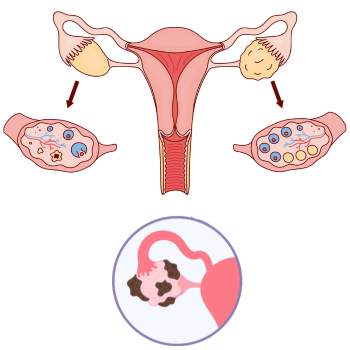KK Virat Hospital, Karimnagar, offers advanced PCOS-PCOD treatment, focusing on diagnosis, lifestyle management, medication, and surgical options. Our expert gynecologists provide personalized care, ensuring effective symptom management and improved fertility. Book an appointment today for comprehensive women’s healthcare solutions.
Understanding PCOS and PCOD
Polycystic Ovary Syndrome (PCOS) and Polycystic Ovarian Disorder (PCOD) are common hormonal disorders affecting women of reproductive age. PCOS occurs when the ovaries produce excess male hormones, leading to symptoms such as irregular menstrual cycles, infertility, and excessive hair growth. PCOD, on the other hand, is characterized by the presence of multiple immature eggs in the ovaries, which eventually turn into cysts.
If left untreated, these conditions can lead to complications such as type 2 diabetes, obesity, and infertility. At KK Virat Hospital, Karimnagar, we provide comprehensive treatment and management strategies to help women regain their health and well-being.

Causes of PCOS-PCOD
- Genetic factors – Family history can play a significant role.
- Hormonal imbalance – Overproduction of androgens can cause irregular ovulation.
- Insulin resistance – Affects the body’s ability to process sugar effectively.
- Unhealthy lifestyle – Poor diet, lack of exercise, and obesity can contribute to the condition.
- Chronic inflammation – Can lead to increased androgen production.
Symptoms of PCOS-PCOD
- Irregular periods – Prolonged or infrequent menstrual cycles.
- Excessive hair growth (hirsutism) – On the face, chest, and back.
- Acne and oily skin – Due to increased androgen levels.
- Weight gain or difficulty losing weight – Especially around the abdomen.
- Hair thinning or hair loss – Male-pattern baldness.
- Dark patches on the skin – Often around the neck, armpits, and under the breasts.
- Difficulty conceiving – Due to irregular ovulation.
Prevention of PCOS-PCOD
- Maintain a Healthy Weight – Regular exercise and a balanced diet can help prevent obesity.
- Healthy Eating Habits – Consuming fiber-rich, unprocessed foods and avoiding sugar-heavy diets.
- Manage Stress – Practicing relaxation techniques such as yoga and meditation.
- Regular Health Check-ups – Routine medical check-ups can help detect hormonal imbalances early.
- Avoid Processed Foods – Reduce intake of processed and fast foods to maintain insulin levels.
Risk Factors of PCOS/PCOD
- Insulin Resistance
- Hyperandrogenism (Excess Male Hormones)
- Obesity and Overweight
- Family History of PCOS
- Sedentary Lifestyle
- Chronic Stress
Foods to Eat During PCOS-PCOD Treatment
- Unprocessed and fiber-rich foods
- Beans and legumes
- Cauliflower and broccoli
- Red grapes, blueberries, cherries, and blackberries
- Avocados and coconuts
- Nuts and seeds (flaxseeds, chia seeds, walnuts, and almonds)
- Whole grains like quinoa, brown rice, and oats
- Lean proteins such as fish, tofu, and chicken
Foods to Avoid During PCOS-PCOD Treatment
- Processed and refined carbohydrates (white bread, pasta, and sugary foods)
- Fried and fast foods
- Dairy products (for those with sensitivity to dairy)
- Red meat in excess
- Sugary beverages and sodas
- Alcohol and caffeine
PCOS-PCOD Diagnosis and Treatment
1. Diagnostic Tests for PCOS-PCOD
- Physical examination to assess symptoms such as acne, hair growth, and weight.
- Blood tests to check hormone levels (androgens, insulin, and glucose levels).
- Pelvic ultrasound (USG) to detect ovarian cysts and monitor the endometrium.
- Lipid profile and thyroid tests to check for associated conditions.
2. Lifestyle Changes
- Regular exercise to help manage weight and insulin resistance.
- Adopting a low-calorie and well-balanced diet.
- Losing even 5% of body weight can significantly improve symptoms.
- Stress management techniques such as yoga, meditation, and deep breathing.
3. Medications
- Birth control pills to regulate hormone levels and menstrual cycles.
- Progestin therapy for 10-14 days monthly to maintain cycle regularity.
- Ovulation medications such as Clomiphene, Letrozole, Metformin, and Gonadotropins.
- Excess hair growth treatments like Spironolactone, Eflornithine, and Electrolysis.
- Insulin-sensitizing agents like Metformin to help regulate blood sugar levels.
4. Dietary Adjustments
- Low-carb diets to regulate sugar and insulin levels.
- Balanced meals to maintain hormonal equilibrium.
- Anti-inflammatory foods such as turmeric, ginger, and leafy greens.
5. Infertility Treatment
- Fertility medications to induce ovulation.
- IVF (In Vitro Fertilization) as a last resort for conception.
- Ovulation induction treatments to improve chances of pregnancy.
6. Surgical Options
- Cyst Aspiration – Draining ovarian cysts if necessary.
- Laparoscopic Ovarian Drilling (LOD) – A minimally invasive surgery to treat ovulation issues.
- Oophorectomy – Removal of part of the ovary in severe cases.
Pre-Surgery Care
- Initial Consultation: Comprehensive evaluation and tests before surgery.
- Dietary Guidelines: Avoid heavy meals and follow a prescribed diet.
- Medication Management: Adjusting or stopping certain medications if necessary.
- Hydration & Fasting: Following doctor’s advice on fasting before surgery.
- Pre-Surgical Counseling: Guidance on the procedure, risks, and recovery.
Assisted Surgery Experience at KK Virat Hospital
We offer a seamless and patient-centric surgical experience, including:
- Advanced Medical Expertise with laser and laparoscopic surgeries approved by USFDA.
- Dedicated Care Coordinators to assist with insurance paperwork, commute, and hospital admission-discharge procedures.
Post-Surgery Care
- Free Follow-Up Consultations: Regular check-ups to monitor recovery.
- Pain Management: Medications and guidance on managing discomfort.
- Dietary Recommendations: Nutritional guidance for faster healing.
- Exercise and Recovery Plan: Gradual introduction of light physical activity.
- Emotional Support & Counseling: Helping patients cope with post-surgery stress.
Does Insurance Cover Adenomyosis Treatment?
Most health insurance policies cover hysterectomy and other adenomyosis treatments. Our hospital assists with all paperwork and insurance claims to provide a seamless experience.
Why Choose KK Virat Hospital for PCOS-PCOD Treatment?
- Expert Gynecologists providing customized and confidential treatment.
- State-of-the-Art Technology for accurate diagnosis and effective treatment.
- Comprehensive Women’s Healthcare to address all gynecological concerns.
- Personalized Treatment Plans based on your unique health needs.
- Advanced Diagnostic and Treatment Facilities for the best outcomes.
Book Your Appointment Today
Ignoring PCOS symptoms can lead to serious health issues. Early diagnosis and treatment can help manage symptoms and prevent complications. If you experience irregular periods, excessive hair growth, or unexplained weight gain, consult our expert gynecologists at KK Virat Hospital, Karimnagar.
- Call Us Directly: Contact our medical coordinators to schedule an appointment with an expert Gynecologist.
- Direct Visit: If you have a medical history, you can visit our hospital directly by carrying your previous medical records. However, admission will be based on the doctor’s recommendation.
What can high levels of androgens cause?
High androgen levels can lead to symptoms like excessive hair growth (hirsutism), acne, scalp hair thinning, irregular periods, and difficulty in ovulation, which may contribute to infertility.
What to do if there is a family history of PCOS?
If you have a family history of PCOS, maintain a healthy lifestyle with a balanced diet, regular exercise, and weight management. Regular medical check-ups and early diagnosis can help manage symptoms effectively.
What are the early symptoms of PCOS?
Early signs of PCOS include irregular or missed periods, acne, excessive hair growth, weight gain, scalp hair thinning, and difficulty in conceiving.
What can increase the chances of getting pregnant for women with PCOS?
Managing weight, adopting a healthy diet, regular exercise, and taking prescribed fertility medications can improve ovulation. In some cases, assisted reproductive techniques like IVF may be recommended.
Is surgery for PCOD – PCOS covered under insurance?
Coverage depends on the insurance provider and policy terms. Some plans cover surgical treatments like ovarian drilling or cyst removal if deemed medically necessary. Consult your insurer for details.
Can PCOS be completely cured?
PCOS is a chronic condition that can be managed but not completely cured. Lifestyle changes, medications, and proper medical care can help control symptoms and prevent complications.
How does diet affect PCOS?
A low-carb, high-fiber diet helps regulate insulin levels and hormone balance. Avoid processed foods, sugary drinks, and unhealthy fats, while consuming whole grains, lean proteins, and anti-inflammatory foods.
Does PCOS increase the risk of other health issues?
Yes, untreated PCOS can lead to type 2 diabetes, high cholesterol, heart disease, high blood pressure, and an increased risk of endometrial cancer. Early management is crucial.
Can women with PCOS have a normal pregnancy?
Yes, with proper treatment and lifestyle modifications, many women with PCOS can conceive naturally or with medical assistance. Managing weight and hormone levels improves fertility chances.
When should I see a doctor for PCOS symptoms?
If you experience irregular periods, excessive hair growth, sudden weight gain, or difficulty in conceiving, consult a gynecologist immediately for diagnosis and treatment options.



